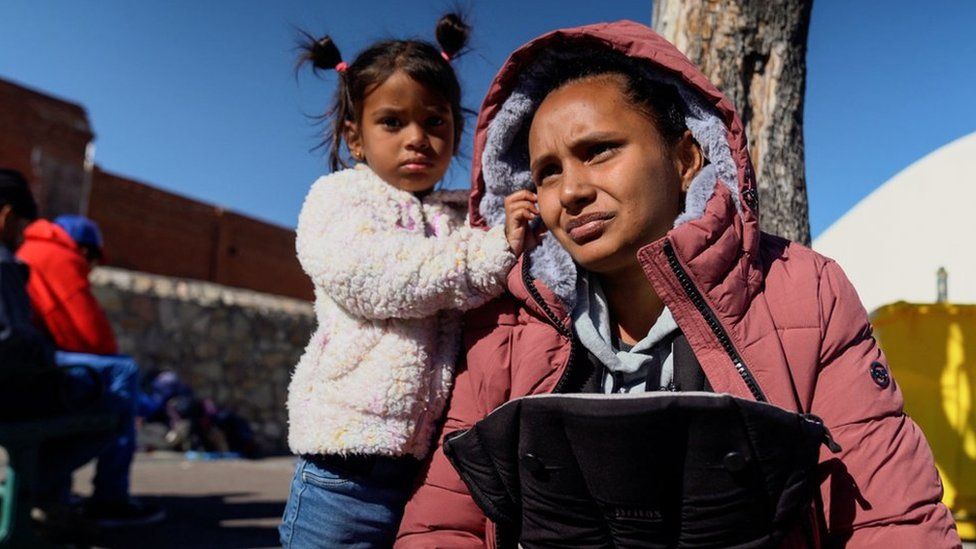For El Paso migrants, an epic journey is followed by a long wait
- Published

To reach the US border, Wilmary Camacho had to cross thousands of miles of mountains and jungles, battling diseases and facing violent robberies - all while travelling with her four-month-old baby and three-year-old daughter.
"The jungle was the hardest part, because of all the things you see there. There were dead people and wild animals. It was so dangerous," the Venezuelan told the BBC. "And we had the kids. Every day was more complicated with the kids."
This week, Ms Camacho was in El Paso, Texas, cradling her eldest daughter Mia atop a pile of donated blankets on a pavement in the city's downtown, her husband a few metres away smoking a cigarette as they plotted their next move.
Their journey is far from over.
"This is just a midpoint," she said. "We're headed to Denver. We've got our tickets now!"
Ms Camacho, 23, is one of more than two million migrants who have arrived at the US-Mexico border in the last year - a number that many fear will spike even further as the US heads into 2023. Nowhere is this more true than El Paso, where swelling numbers of migrants in recent weeks have left local officials scrambling for resources.
Like the Camacho family, life in the US for most of the migrants claiming asylum begins when they present themselves to Customs and Border Patrol (CBP) officers at the US border.
Once processed, the migrants - recently nearly 1,500 each day in El Paso alone - are released to local officials and organisations, who feed them, give them water and donations of clothes and provide temporary shelter.
These groups also help the migrants coordinate their travel plans. Most hope to travel further into the US to be reunited with family or to find work while they await court dates that will ultimately determine their status in the country.
On the streets of El Paso this week, the BBC spoke to migrants on their way to places across the US. Some are classified as "sponsored" migrants who have relatives or friends offering financial support, while others are travelling with no connections at all and with little more than the clothes on their back.
"I'm going to New York. I've got a niece there," said Elois Acelvedo, a Nicaraguan woman who said she was left penniless after being robbed while travelling alone on the journey north. "A guy from the city came yesterday and told us they'd help. But nobody's come back."
For Ms Acelvedo, getting to New York is urgent. Choking back tears, she explained that her three sons - the youngest under a year old - remain in Nicaragua and are depending on her.
"It's a sacrifice…life in Nicaragua was impossible. I could have worked like a slave and made just $30 (£25) a week. Even food was so expensive," she said. "Now, thank God, I'll be able to send money. That's all I want."
Elianny Rodriguez, a Dominican, told the BBC that the hardest part was waiting for what's next. She plans to head to New Jersey, where she has friends and relatives among the state's already large Dominican diaspora.
"I've been here for nine days in this craziness, just waiting to get started on a better future for my family," she said. "Then the plan will be to wait for that [court] date and not cause any mischief. Just have a normal life."
Ms Rodriguez may not have long to wait. On Wednesday afternoon, she explained that city officials had got her a ticket on the next "guagua" - a Dominican term for a bus - to New York.
"All they told me is that the government was helping people get to New York," she said. "We're very thankful."
Life for the migrants waiting in El Paso is one spent waiting - for answers about their transport, or simply for their next meal.
Rodrigo Antonio Hernandez, a 52-year-old former army officer who said he fled Venezuela after being tortured by government agents, said that most of the migrants are simply hoping to stay out of trouble and not anger the local community before they move on.
On a recent morning, Mr Hernandez was directing other migrants to clean up their sleeping area and throw away rubbish while they waited for a delivery from a local food bank.
"We have to be disciplined," he told the BBC, pointing to a tightly rolled up blanket and packed bag in a city park. "We don't want people to think we shouldn't be here, or for the community to not want us. If we get this area dirty, people will have a bad idea about migrants."
Watch: Families will spend Christmas far from home - and loved ones.
A few have no plan at all other than to start life afresh in the US.
Among them are Chilean citizen Kenia Contreras and her Venezuelan husband Anthony Ybarra, who - along with their four-year-old son - arrived in the US after a trip that took them across nine countries from Chile to the US border.
"I've got family here, in Atlanta and Houston," Mr Ybarra said, a wide grin across his face. "But we don't want to interrupt anyone's life. If other people can do it with no help, so can we. We're here to work, not to ask for things."
Where they'll go and what they'll do there, they say, remains a mystery.
"I want to give this kid a better life…we'll go where God lets us go," Ms Contreras said, pointing to her son as he sat on the pavement, playing with the shoelaces of a nearby adult. "Whatever it takes, even if I have to sell caramels or candy. And when we find work, we'll give it our all."
Additional reporting by Alexandra Ostasiewicz
Related Topics
- Published22 December 2022
- Published20 December 2022
- Published21 December 2022
- Published12 December 2022